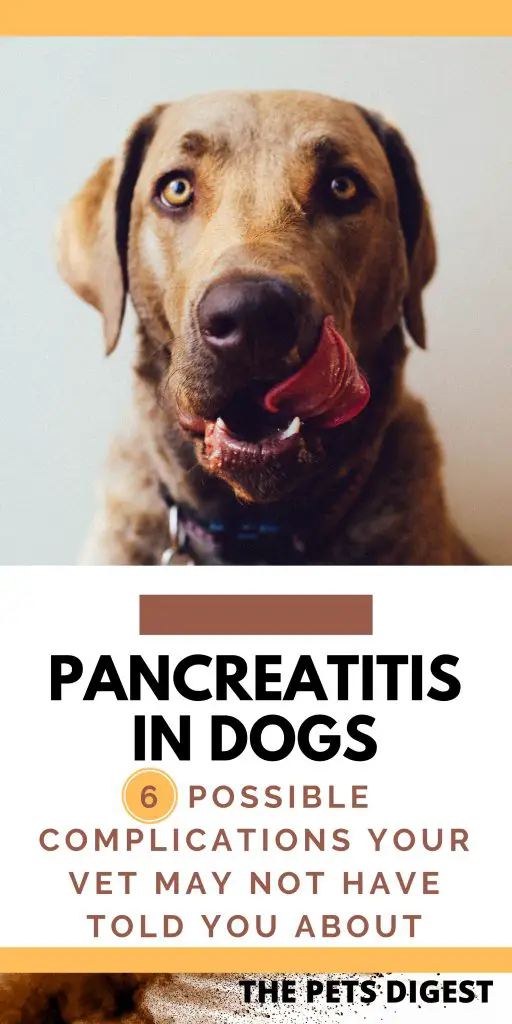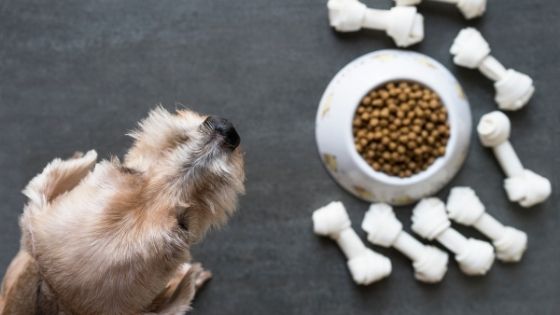While it has been stated that at least 27% of dogs that suffer from bouts of pancreatitis die, the majority of pets go on to live happy, normal, and healthy lives. The prognosis depends on the extent of the disease and response to treatment. It can be quite troubling to find out your dog has pancreatitis as the long-term outcomes can be difficult to predict.
Most mild forms of pancreatitis have a great prognosis and while long-term effects are rare, you should still be educated and aware.
Let’s take a look at some of the possible routes that a dog suffering from pancreatitis can go down.
Exocrine Pancreatic Insufficiency (EPI)
Pancreatitis is second only to idiopathic pancreatic acing atrophy (PAA) as a cause of EPI.
What is EPI you may ask? Simply put, exocrine pancreatic insufficiency is when a significant number of cells that produce digestive enzymes are destroyed. This, in turn, means that your pup’s food cannot be properly digested.
EPI can negatively affect the gastrointestinal system as it can cause problems with weight (they are usually thin), diarrhea, and nutrition in general. The disease can occur in both dogs and cats but seems to be hereditary in German Shepherds. Dogs that suffer from EPI will need supplemental enzymes added to their diets.
Diabetes
The pancreas is responsible for two major functions as stated previously the secretion of digestive enzymes and insulin which regulates blood glucose. If enough of these cells are destroyed in a case of pancreatitis diabetes can ensue. This is fairly rare and dogs that acquire diabetes will most likely require supplemental insulin.
Renal failure & liver damage
Digestive enzymes are extremely toxic to other organs and in the case of severe pancreatitis, the enzymes can overflow onto other organs and cause significant damage. While uncommon this could result in renal and liver damage.
Abdominal Adhesions
If the digestive enzymes reach other organs abdominal adhesions can also occur. These are bands of tissue that form between organs and other tissues that cause them to not be able to move and shift as needed for proper function. Usually, the surface of the organs and mesentery are fairly slippery and have no problem moving, but when adhesions occur it is another story.
Most adhesions cause no symptoms or major problems but in some cases, chronic pain or intestinal obstruction can occur.
Buildup of fluid and tissue debris (pseudocysts)
As a sequel to pancreatitis, pancreatic masses have been reported in both dogs and cats.
These masses include pancreatic pseudocysts in both species and pancreatic abscesses and necrotic mass lesions in dogs. Pancreatic pseudocysts have been reported in dogs and cats, whereas necrotic mass lesions of the pancreas and pancreatic abscesses have been reported only in dogs.
The clinical signs associated with pancreatic pseudocysts, necrosis, and abscesses are very similar to those of pancreatitis.
If you’d like to learn more about pseudocysts after pancreatitis here is the reference to the information above.
Acute flare-ups that keep coming back
Chronic Pancreatitis occurs in some dogs after suffering from an acute case. Chronic Pancreatitis is when a dog will have to be consistently monitored for flare-ups and in. most cases will have to eat a low diet for life.



























































































































OK,GOOD INFO but what do I do for my yorkie that has chronic pancreatitus
Hi, part of the reason I started this blog was for my little dog Chi-Chi, that was also a yorkie and also had pancreatitis! What I did for him was to ensure he was on a really low-fat diet (less than 10% fat- that went for food and treats), I made a lot of his food at home and he got a lot of natural treats like broccoli, carrots, and apples (sparingly because they are higher in sugar), he didn’t like berries but if he did I definitely would have fed him those as they are great antioxidants. If I purchased treats, I usually stuck to treats that were very limited in ingredients usually just one to three ingredients at the most, so dehydrated sweet potato or beef etc. Speak with your vet to see if any of these things may be appropriate for your dog … Also, I have a couple other articles about pancreatitis in dogs that may be of interest to you here: https://thepetsdigest.com/2067-2/ … hope this helps!
Good blog. I too do similar. To many dogs foods are high in fats and especially protein. Watch out for this . My dog loved natural chews.!!!
Found out the were 90% in Protein. Caused a pancreatic flare which we were able to control luckily.
Now on – 10% food n treat of fat n protein. He’s a new dog!
Thanks! Great insights, I’m glad your little guy is doing better, there is so much more research that needs to occur around pancreatitis and our pets to determine all of the possible causes.
Hey would you mind letting me know which web host you’re utilizing? I’ve loaded your blog in 3 different internet browsers and I must say this blog loads a lot faster then most. Can you recommend a good web hosting provider at a fair price? Thank you, I appreciate it!